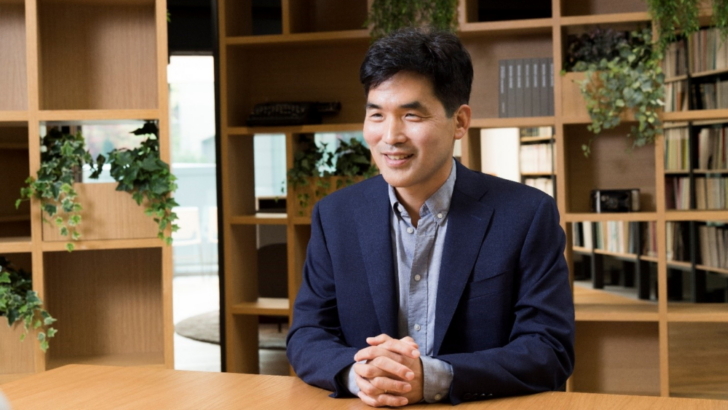[Hearing from an AI Expert – 6] AI and 5G: A Two-Pronged Revolution
on October 24, 2019

One of the most exciting things about the times we live in is the fact that we stand on the precipice of several major technological shifts. What’s more, the individual innovations that make up these seismic changes are not happening independently, but rather are interweaving to inform and empower one another. As we stand here at the edge, no two innovations are enlivening and empowering the tech industry more than those of AI and 5G.
While AI is making technology smarter across the board, 5G is ensuring that connection speeds are fast enough to allow platforms to interface in real-time. So how exactly do AI and 5G work hand-in-hand to make each other, and the entire tech industry, stronger? Dr. Gregory Dudek, Head of the Samsung AI Center in Montreal, extrapolates on the interplay between the two innovations, and how they stand to change things for consumers.
AI for 5G and Beyond
The Montreal AI Center’s primary area of focus is ‘AI-for-5G’, as Dudek explains. “Bringing the strength of AI to bear in order to make use of the full potential of 5G is the key focus of our research in Montreal,” he relates, “The area is a natural fit for our center, since Montreal is one of the world’s hotbeds for AI research, as well as having a telecommunications research community that has a decades-long history.”
Dudek relates that 5G (and beyond 5G) telecommunications systems are very flexible, and can outperform older systems such as 4G, but that extensive configuration is required to take full advantage of them. “In order to exploit 5G networks’ full potential, and make them applicable for a wide range of users, devices and needs, extensive automated reconfigurability is required,” Dudek says, “And that is where AI comes into the picture.”
The impact that AI stands to have on almost every aspect of our lives, and on our technologies as a whole, is immense – there are few areas of the industry that aren’t expected to be revamped by the introduction of artificial intelligence. “Telecommunication systems have been getting steadily more complex since they were first developed,” Dudek says, “In almost all areas of digital communication, complex optimization problems arise and are solved by increasingly sophisticated solutions that I would often call AI.” According to Dudek, the main thing that AI allows devices to do is “adapt to changing conditions”, and this can lead to those devices being optimized in ways that have rarely been seen before. He says that 5G’s “richer protocols and abundance of cells” provide an opportunity to enhance performance with learning-based AI algorithms, and claims that using AI for 5G is likely to prove “more of a fundamental requirement for state-of-the-art performance than just an opportunity.”
5G Underpins the Future
Just as AI can be used to optimize 5G networks, the enhanced performance characteristics of 5G will be important for many key applications of AI in our daily lives.
Dudek outlines that 5G will be an essential component in many of the key applications of AI. Among those applications, Dudek highlights the automotive, edge computing, robotics and medicine sectors, among others.
“One of the clearest needs is in the domain of autonomous cars and delivery vehicles,” he expands, “Efficient coordination of automotive vehicles will depend on the reduced latency that 5G networks offer.”
Dudek also touches on the area of ‘edge computing’, which is additionally set to empower and be empowered by the introduction of 5G. Edge computing means computing that is done very close to data sources, so that relays back and forth from the cloud are minimized. 5G will accelerate communication speeds between ‘the edge’ and the public cloud, while edge computing, in turn, will improve cybersecurity on 5G networks, reduce the burden on the public cloud and lead to savings on storage and processing costs. Eventually, edge computing is expected to prove helpful in realizing AI’s potential because it will allow computation to be distributed across more devices. 5G is also expected to contribute in this area by accommodating a potentially very large number of edge clients and allowing them to do real-time processing with low latency.
Dudek says that robotics will be another important application of 5G, pointing out that areas such as robotic vision, reasoning and action will all depend on the high-quality connectivity it provides. “Many of the most exciting applications of robotics will combine edge computing, sensing, big data in the cloud and interactions between multiple devices,” Dudek reports, “The combination of bandwidth and low-latency will be critical for things like robotic telemedicine solutions as well.”
Touching on other sectors that 5G connectivity is set to empower, Dudek highlights those of medicine (telemedicine, smart diagnostic capabilities and therapeutic technologies), leisure (multiple streams and viewpoints for sports events and rich, multi-person VR), public transportation and factory automation. “In fact,” Dudek concludes, “if we see 5G and AI as a combined package, then there are very few areas of human activity where there will not be some impact.”

Samsung’s Position
The versatility and power of 5G networks will allow for new kinds of connectivity and the emergence of an all-new family of devices. And, as the dual rise of AI and 5G expands capabilities, the degree to which companies and individuals will be able to take advantage of the resulting solutions will depend on their access. That is why Samsung’s position is such a promising one.
“Samsung has successfully exploited successive waves of the most modern and rapidly-changing technologies,” Dudek imparts, “When it comes to these upcoming innovations – not just AI and 5G, but edge computing, multi-device interactions, machine learning, robotics and personalized devices, – a fluid combination of hardware and software will be crucial. The company’s extensive experience in creating individual devices that can talk to one another and have overlapping functions means that Samsung is in an exceptional position to lead this family of emerging technologies.”
Touching on other areas that are expected to change things for consumers, Dudek says that he also expects Samsung to be instrumental in the sphere of robotics, as well as when it comes to innovations regarding original technologies such as AI and 5G. “It cannot be overlooked that robotics is expected to have a huge influence on our lives,” Dudek says, “And, as robotics is a synthesis of AI and mechatronics, this area is very well-matched to Samsung’s strengths as well.”
What AI and 5G Will Bring to Consumers
For most of us, our devices have already become crucial to going through our daily routines, but the dual inception of 5G and AI is set to make our devices even more complementary to our day to day lives.
“In the near term, AI will make our home lives healthier, safer and more fun,” Dudek says, “But AI also has the potential to help people communicate more easily across linguistic and geographic boundaries.”
“A world where 5G-dependent smart devices become woven into our lives is much closer than most people expect,” Dudek continues, “I expect this embedded, interconnected intelligence to start playing a role in our lives in the near future.”
When one considers the entirety of the picture that Dudek paints, it is hard not to start seeing AI and 5G as more of a necessity than a luxury. Asked how he envisions the combined inception of 5G and AI will change our lives, he says “One of my goals as a researcher is to have a positive impact on the world, and to play a role in bringing important new technologies to life.” He also says that he expects the introduction of 5G and AI to progressively take away more and more of the mundane tasks that people deal with day-to-day. “People will expect much more from the objects around them,” he says, “and this will allow them to focus more on the aspects of their lives that they find more rewarding.”





